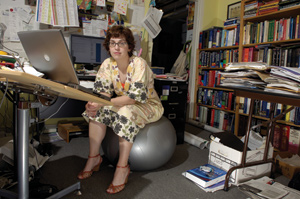|
||
      |
Peer Review ::
Caution: words at work
Lexicographer Erin McKean tracks up-and-coming words as they fight their way into the dictionary.

Hundreds of dictionaries, thesauri, and other reference materials flank
the walls of McKean’s word workshop, where she ferrets out dictionary
additions.
Bling, bling, bling,” murmurs Erin McKean, AB’93, AM’93, as she taps her keyboard. Perched on a large gray yoga ball in her cramped basement office, she scans the screen as the Oxford English Corpus, an online database of more than a billion words, trolls through its contents. “No hits for bling-bling as a verb,” the editor reports. She taps again. Five seconds later, pay dirt—more than 1,000 hits for bling-bling as a noun and 63 pages of citations. Enough to squeeze it into the official lexicon.
The biggest misconception about dictionaries, says McKean, editor in chief of the New Oxford American Dictionary, is that it is “an honor roll for words,” with selection based on some inherent beauty of the term. She prefers a toolbox analogy, with usefulness, not aesthetics, as the guiding principle. All words that eventually make their way into Oxford’s dictionaries come from the online corpus, which, using a program created by the company, catalogs terms from nearly every type of writing, from sports journalism to romance novels. (Poetry and song lyrics are two exceptions; both often use words in ways that don’t necessarily reflect mainstream usage.) New technical jargon, medical vocabulary, or complex ideas are more likely to make the pages than slang, which tends to have limited shelf-life, but what McKean calls “blockbuster hits” like bling-bling may snag a spot.
For words that don’t make the usefulness cut but that she finds too irresistible to hide from the world, McKean compiled Weird and Wonderful Words (2002) and More Weird and Wonderful Words (2003), both from Oxford University Press. The two volumes are chock-full of terms like kurdaitcha, an Australian word for a malignant supernatural being that can allegedly be warded off by wearing shoes made of emu feathers and human blood. Totally Weird and Wonderful Words, a paperback edition of her complete collection plus 100 new words, is due out in September.
Constantly culling specimens from an ever-evolving lexicographical landscape, McKean likens herself to a Victorian-era naturalist. She pulls up some recent discoveries on her Blackberry: apophenia (comprehending dissimilar things as being the same); lamassu (a winged lion or bull figure with human head—the word did not make her weird-word list because too many people had heard of it); and terri-poo (a terrier-poodle mix).
It’s not only professionals who chart the word waters. “We’ll talk to anybody who wants to provide text,” says McKean, a board member of the nonprofit American National Corpus, which compiles an electronic database intended to “provide the most comprehensive picture of American English ever created.” Be it a grandfather’s unpublished World War II letters or an out-of-print novel, any work submitted to the organization becomes part of the data lexicographers investigate to “see how English works.”
McKean has been trying to figure out how the language functions since she was eight years old. Pulling out a weathered copy of the April 3, 1980, Wall Street Journal, she points to an article about New Zealand native Robert Burchfield, the Oxford English Dictionary’s then-editor in chief. “Cool,” she remembers thinking. “Somebody makes a dictionary.” She clipped the piece, and years later got her professional start as a student working on the Oriental Institute’s Akkadian dictionary with the late Erica Reiner, PhD’55. “Mostly I underlined things in colored pencils and filed,” she confesses, but the experience exposed her to the art of classical dictionary-making and working from ancient tablets. An internship at Thorndike-Barnhart creating children’s dictionaries rounded out her early training. Meanwhile, she says, “my professors were quite indulgent when I would turn whatever the class was supposed to be about into something about dictionaries.” Her final paper for a feminist-theory class, for example, focused on the adoption of Ms. into the dictionary.
“Lexicographers are in it for the psychic paycheck,” she says, explaining the thrill of stumbling across a new word or defining a challenging one. But passion doesn’t mean editors are infallible. The most common error, explains McKean, is defining a word too narrowly. If a group of citations all relate to jazz, for example, the word might be regarded as jazz-specific when it actually has a broader meaning. The jazz community simply uses the term more often.
Such blunders rarely pass unnoticed. Some people, says McKean, are “overjoyed” to find a dictionary error. Others threaten never to buy a dictionary again. Then there are those who think certain words should be excised. “Language is highly emotional,” says McKean, citing the case of David Howard, a D.C. mayoral aide lambasted in 1999 for using the word niggardly in a staff meeting. (The word, which means “stingily,” is not etymologically related to the racial slur.) “There’s no logical reason not to use that word,” says McKean. “But language isn’t logical.” The Oxford entry for niggardly now contains a cautionary note.
To those who argue for a word’s removal, McKean says she doesn’t have the power to expunge words from the language. “Taking the warning sign off the hole doesn’t take away the hole. ... All I can do is tell people to watch out.”